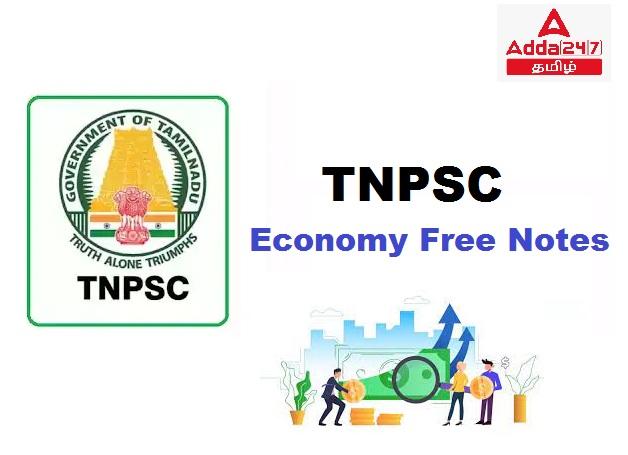இந்தக் கட்டுரையில், TNPSC குரூப் 1, குரூப் 2, குரூப் 2A, குரூப் 4 மாநிலப் போட்டித் தேர்வுகளான TNUSRB, TRB, TET, TNEB போன்றவற்றுக்கான முறைகள் இலவசக் குறிப்புகளைப் பெறுவீர்கள்.தேர்வுக்கு தயாராவோர் இங்குள்ள பாடக்குறிப்புகளை படித்து பயன்பெற வாழ்த்துகிறோம்.
About Tax System In India
Taxation
Taxation is a term for when a taxing authority, usually a government, levies or imposes a
tax.
The term ‘taxation’ applies to all types of involuntary levies, from income to capital
gains to estate taxes.
Taxes
Taxes are compulsory payments to the government without expectations of direct or
return or benefit to the taxpayers.
According to Prof. Seligman, taxes are defined as a compulsory contribution from a
person to the government to defray the expenses incurred in the common interest of all
without reference to special benefits conferred.
Principle of taxation
Adam Smith’s principles or cannons of taxation still form the basis of the tax structure of a
modern state
1. Canon of Equality
2. Canon of Certainty
3. Canon of Convenience
4. Canon of Economy
1. Canon of Equality
The government should impose taxes in such a way that people have to pay according
to their ability.
It does not mean equal amount of tax but it means that the burden of a tax must be fair
and just.
2. Canon of Certainty
Certainty creates confidence in the taxpayers cost of collection of taxes and increases
economic welfare because it tends to avoid all economic waste.
3. Canon of Convenience
Taxes should be levied and collected in such a manner that it provides a maximum of
convenience to the taxpayers.
It should always be kept in view that the taxpayers suffer the least inconvenience in
payment of the tax.
4. Canon of Economy
Minimum possible money should be spent in the collection of taxes.
Collected amount should be deposited in the Government treasury.
Taxation Types
There are three types of Taxation:
1. Proportional Tax
2. Progressive Tax
3. Regressive Tax
Proportional Tax: Tax is imposed at the same rate irrespective of the income (tax base)
of a person.
Progressive Tax: The rate of tax increases with the increase in income (tax base) of a
person.
Regressive Tax: A regressive tax is a tax applied uniformly, taking a larger percentage of
income from low-income earners than from high-income earners.
Importance of Tax
Without taxes, governments would be unable to meet the demands of their societies.
Taxes are crucial because governments collect this money and use it to finance the
following social projects.
Health
Without taxes, government contributions to the health sector would be impossible.
Taxes go to funding health services such as social healthcare, medical research,
social security, etc.
Education
Education could be one of the most deserving recipients of tax money.
Governments put a lot of importance in the development of human capital and
education is central in this development.
Governance
Governance is a crucial component in the smooth running of country affairs.
Poor governance would have far-reaching ramifications on the entire country with a
heavy toll on its economic growth.
Good governance ensures that the money collected is utilized in a manner that
benefits citizens of the country.
Other important sectors are infrastructure development, transport, housing, etc.
Apart from social projects, governments also use money collected from taxes to
fund sectors that are crucial for the wellbeing of their citizens such as security,
scientific research, environmental protection, etc.
Some of the money is also channelled to fund projects such as pensions,
unemployment benefits, childcare, etc.
Taxes can affect the state of economic growth of a country.
Taxes generally contribute to the Gross Domestic Product (GDP) of a country.
Types of Tax
Direct Tax
A direct tax is referred to as a tax levied on a person’s income and wealth and is paid
directly to the government.
The burden of such tax cannot be shifted.
The tax is progressive in nature.
It is levied according to the paying capacity of the person, i.e. the tax is collected more from
the rich and less from the poor people.
The plans and policies of the Direct Taxes are being recommended by the Central Board of
Direct Taxes (CBDT) which is under the Ministry of Finance, Government of India.
Merits of Direct Taxes
Equity
Direct taxes are progressive i.e. rate of tax varies according to the tax base.
For example, income tax satisfies the canon of equity.
Certainity
Canon of certainty can be ensured by direct taxes.
For example, an income taxpayer knows when and at what rate he has to pay
income tax.
Elasticity
Direct taxes also satisfy the canon of elasticity.
Income tax is income elastic in nature.
As income level increases, the tax revenue to the Government also increases
automatically.
Economy
The cost of collection of direct taxes is relatively low.
The taxpayers pay the tax directly to the state.
Demerits of Direct Taxes
Unpopular
Direct taxes are generally unpopular.
It is inconvenient and less flexible.
Productivity affected
According to many economists, the direct tax may adversely affect productivity.
Citizens are not willing to earn more income because in that case, they have to pay
more taxes.
Inconvenient
The taxpayers find it inconvenient to maintain accounts, submit returns and pay
tax in a lump sum.
Tax Evasion
The burden of direct tax is so heavy that taxpayers always try to evade taxes.
This ultimately leads to the generation of black money, which is harmful to the
economy.
Indirect Tax
Indirect Tax is referred to as a tax charged on a person who purchases goods and
services and it is paid indirectly to the government.
The burden of tax can be easily shifted to another person.
It is levied on all persons equally whether rich or poor.
Types of Indirect Taxes:
Excise Duty: Payable by the manufacturer who shifts the tax burden to retailers and
wholesalers.
Sales Tax: Paid by a shopkeeper or retailer, who then shifts the tax burden to
customers by charging sales tax on goods and services.
Customs Duty: Import duties levied on goods from outside the country, ultimately
paid for by consumers and retailers.
Entertainment Tax: Liability is on the cinema theatre owners, who transfer the burden to
cinema-goers.
Service Tax: Charged on services like telephone bill, insurance premium such as food bill in a
restaurant etc.
Merits of Indirect Taxes
Wider Coverage
All the consumers, whether they are rich or poor, must pay indirect taxes. For this
reason, it is said that indirect taxes can cover more people than direct taxes.
For example, in India, everybody pays indirect tax as against just 2 percent paying
income tax.
Equitable
The indirect tax satisfies the canon of equity when a higher tax is imposed on
luxuries used by rich people.
Economical
The cost of collection is less as producers and retailers collect tax and pay to the
Government.
The traders act as honorary tax collectors.
Checks harmful consumption
The Government imposes indirect taxes on those commodities which are harmful
to health. E.g. tobacco, liquor etc. They are known as sin taxes.
Convenient
Indirect taxes are levied on commodities and services.
Whenever consumers make a purchase, they pay tax along with the price. They
do not feel the pinch of paying tax.
Demerits of Indirect Taxes
Higher Cost of Collection
The cost of collection of indirect taxes is higher than the direct taxes.
The Government spends huge money to collect indirect taxes.
Inelastic
Indirect taxes are less elastic compared to direct taxes.
As indirect taxes are generally proportional.
Regressive
Indirect taxes are sometimes unjust and regressive in nature.
Since both rich and poor persons have to pay same amount as taxes irrespective
of their income level.
Uncertainty
The rise in indirect taxes increases the price and reduces the demand for goods.
Therefore, the Government is uncertain about the expected revenue collection.
So, Dalton says under indirect taxes 2+2 is not 4 but 3 or even less than 3.
No Civic Consciousness
As the tax is hidden in price, the consumers are not aware of paying tax.
**************************************************************************
| Adda247 TamilNadu Home page | Click here |
| Official Website=Adda247 | Click here |









